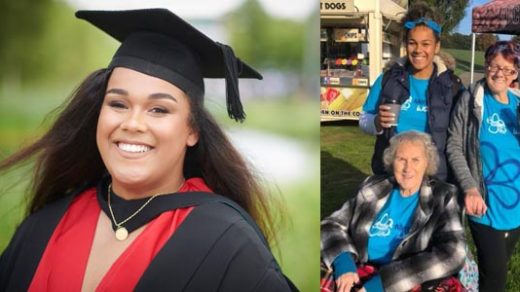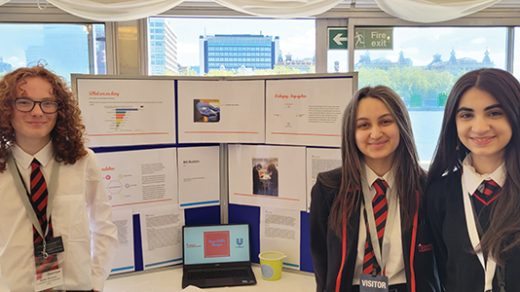Turning tragedy into advocacy

In 2021, teacher, Nina Smith, was looking forward to starting her master’s degree at Edge Hill University when she received a knock at her door and was told the tragic news that her younger brother, Will, had taken his own life at the age of 30.
“It still feels like a nightmare that I’m waiting to wake up from,” she says.
For the last 10 years, Nina worked in a primary school in Wigan. Teaching was not a profession that she imagined she would enter.
“I hated school,” Nina says. “I found it difficult to concentrate in lessons and I didn’t have good relationships with a lot of my teachers. I never considered going to university or even doing A-levels. My parents thought I should go straight into work, like they did, and I was told by my school that I would be better suited to doing an NVQ level 2 in hair and beauty.”
But there was one subject that Nina did love at school and that was health and social care.
She adds: “I found it fascinating learning about the inequalities and the social determinants of health and how they impacted people throughout their lives. That was a double award GCSE, which meant it had double the workload of my other subjects, but it had a real research focus which I was able to tailor to what I was interested in.”
After achieving two A*s at GCSE in the subject, and following some encouragement from her teachers, she chose to go on and study it at A-level.
Nina continues: “Until that point, I had never ever considered myself academic or thought about higher education at all. I loved it even more at A-level and I suppose even now, all these years later, health and social care is still very much at the heart of what I do.”
As part of the course, Nina had to take on a work placement, which she chose to do at her old primary school and that’s when she started to think about the difference that she could make if she became a teacher.
She says: “I then got a job in a lovely little village primary school as a teaching assistant while I studied a degree through the Open University. It was difficult to manage working and studying at the same time, but I needed to work, and I suppose I still didn’t really think university was for me.”
While working as a teaching assistant, it gave Nina a real insight into what it was like to be a teacher and what it entailed – the good and the bad.
“What struck me most was the relationships the teachers built with the children throughout the year,” Nina explains. “It was these relationships with the children and the families, that enabled the children to really flourish. I was amazed every year by how much progress each child would make. It then became my dream to be a teacher.”
However, this wasn’t a straightforward journey for Nina. Although well on her way with the degree, she was also juggling being a young single mum and, sadly, battling an eating disorder.
She adds: “I continued to work and study but I was very ill, and it ended up dominating every minute of my life. After my health deteriorated significantly, I was referred urgently to an eating disorder clinic. I was determined that I was going to get better and as part of my recovery process, I made some real changes which included finishing the final year of my degree at UCLAN. I chose to write my dissertation on the increase in prevalence of eating disorders in children and adolescents, and the more I read, the more I learned and the more it helped my recovery.”
One of Nina’s proudest moments was graduating with a first-class degree and being awarded an outstanding achievement award by the Mayor of Preston.
Instead of a traditional PGCE, Nina decided to join the profession via the school’s direct route.
Nina comments: “Being a teacher always felt like an enormous privilege. Parents are trusting you with the most important thing in their life and I never took that for granted. That was always there at the back of my mind. Yes, there was the endless tick boxes, the pointless paperwork and the school politics, which you feel mentally, but the positives always outweighed those negatives.”
Working as a teacher, Nina started to become more concerned about the mental health of cohorts each year. She recognised that the prevalence of mental ill health, and the severity of it, was increasing and it was particularly apparent after lockdown.
Nina says: “The children had spent so much time isolated and immersed in the toxicity of social media, or trapped in difficult family situations, that the confidence when they came back to school was just at an all-time low. I spoke to my headteacher about it and asked whether I could develop some confidence workshops for my year five class at the time. The learning from them seemed to infiltrate the thoughts of the classroom. The children were kinder to themselves, kinder to one another, and my relationship with the children blossomed.”
It was around this time that Nina started looking into master’s degrees and came across one at Edge Hill University in sport, physical activity and mental health.
“Each module, when I clicked on it, seemed to really reflect the areas that I wanted to develop,” she explains.
“I found it fascinating learning about the inequalities and the social determinants of health and how they impacted people throughout their lives.
was heading, I felt like if I pursued a master’s it would be a step in the right direction.”
Nina successfully secured funding for the degree from Everton in the Community. As a component of this achievement, she was to undertake a research project centred around self-harm and suicide prevention.
As she was preparing for this exciting new chapter in life, Nina received a knock at her door that would change her, and her family’s, life forever.
She comments: “There was this cruel irony that I had been so excited to start my research into suicide prevention and a master’s degree into mental health. Then suddenly, suicide wasn’t a shapeless, obscure word that I was going to research. It was now something in my life. It’s like my dream had become a nightmare.”
Will had struggled with his mental health over the years but even more so during lockdown. He had attempted to take his own life four days before he died but was given no mental health assessment or support from the hospital.
“As I tell you [Educate] this I don’t actually believe a word of it. I feel like I can tell you this because this isn’t my story to tell because how could it possibly happen to me?” Nina adds.
Naturally, Edge Hill University was incredibly understanding and compassionate of Nina’s situation and offered her the option of deferring. However, Nina decided that, despite her grief, she would continue, and she threw herself in to her studies.
She comments: “My first day at Edge Hill was only four days after the funeral, and we spent the day completing suicide prevention training. If only I had done this training a few weeks earlier, maybe I could have helped my brother.
“It took me a while to be able to interact with people. When I first started, during lectures, tears would stream down my face as the content we were learning about was so pertinent and personal to me.”
As part of her degree, Nina carried out workshops in secondary schools across the north west which were designed to empower female students by providing a space in which they could share their lived experiences of their own mental health and illness. The content was highly sensitive and included rape and sexual assault, self-harm, eating disorders, drugs and alcohol suicide.
She says: “The plan was never to tell them about my own experiences, but the girls inspired me so much. They opened up and they told me things that were happening to them now. I planned on telling them a little bit about me, just scratching the surface, but I ended up going so much deeper because their own strength and courage inspired me.
“I felt like I healed because of it – it was a cathartic experience.”
Amazingly, Nina graduated with a distinction in MSc sport, physical activity and mental health and is now working towards her PhD at Edge Hill University, in partnership with Sport England, British Cycling and the Department for Culture, Media and Sport.
In addition, Nina has also won a prestigious Winston Churchill Fellowship.
She says: “I came across the fellowship, which had a suicide prevention theme, just as I finished my thesis. I knew I had to apply because my research proposal practically wrote itself.”
As part of this, she will travel to Australia and the USA next year to explore successful schoolbased suicide prevention strategies.
Nina hopes her learning from the fellowship, which is supported by Samaritans, will help to inform policy and practice in the UK, helping schools to be better equipped in providing vital support.
“I suppose it’s about recognising that every teacher in every school wants the pupils to succeed both personally and academically,” Nina concludes. “But teachers need the tools, the training, the funding and the environment to do it. At the moment, it is just impossible as schools are under more pressure than ever to get students to catch up academically and are now also expected to act as mental health hubs. That further deteriorates people’s mental health, which is what I found in my thesis.
“I’m hoping the insights again from my fellowship will provide clear guidance on how to deliver specific mental health content in schools.”







